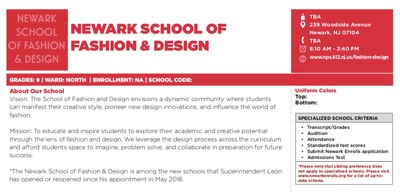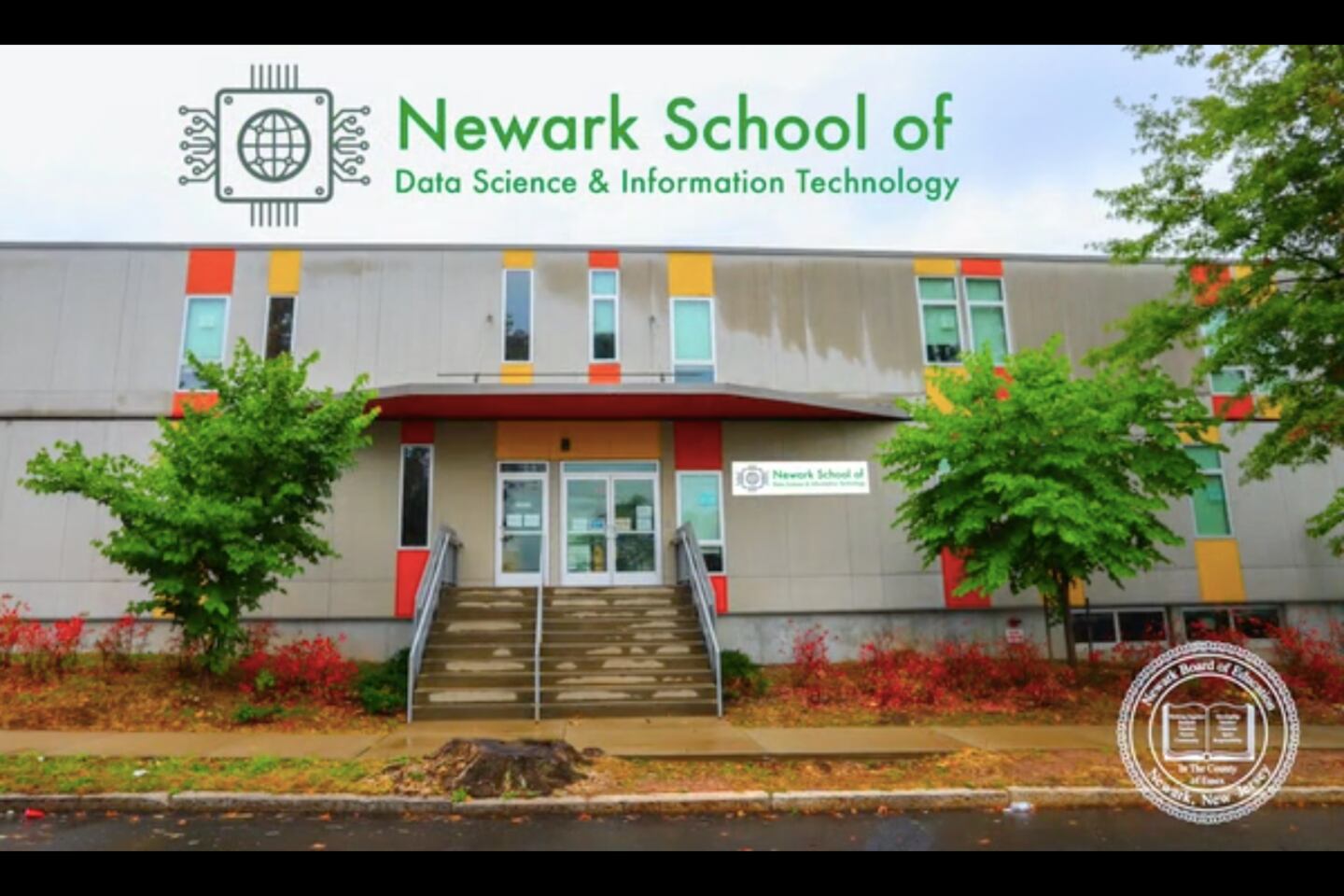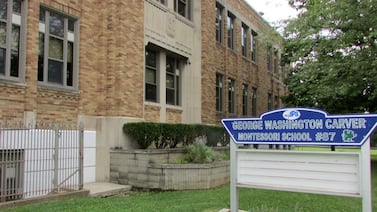Several new public high schools are opening their doors in Newark, but only a select few students will be invited inside.
Dedicated to fashion, data science, and international studies, the new “specialized” schools will use a battery of assessments to handpick their students. Applicants must submit their middle-school grades, attendance records, and test scores; take the district’s high school admissions exam; and undergo other evaluations, including an interview, audition, or writing assessment.
The stringent admission requirements mean the schools will only admit a small number of the rising ninth graders who submit applications, which are due next week. With the addition of the specialized schools, 11 of the district’s 17 high schools will now decide which students to admit based partly on how well they performed in middle school.
That doesn’t sit well with some Newark families and student advocates, who say high school seats should be open to the city’s wider student population.
“They kind of say, ‘These are who we want to come here, and if you can’t live up to our standards, then you can’t come,’” said Ashley Paris, whose daughter is applying to several Newark high schools this fall, including one of the new programs. “They should allow these kids to have the opportunity to go there whether they meet the requirements or not.”
All eighth graders in the Newark school district, and those in private or charter schools hoping to attend a district high school, must take the high school admissions exam. Some cities, including Boston and Washington, D.C., canceled their high school admissions tests this year because they could not be safely administered in person during the pandemic.
But in Newark, where schools are operating remotely, the district will have students take the test online next month.
“It’s extremely important for everyone to know that there is an admissions test to enter into any of our high schools,” Superintendent Roger León said last week during an online interview with Project Ready, a Newark-based advocacy group focused on civic engagement and schools. “They will not be in person; all of the exams will obviously be online.”

The new high schools launching this fall are the Newark School of Fashion & Design and the Newark School of Data Science & Information Technology. They join the Newark School of Global Studies, which welcomed its first freshmen class this school year.
The district has designated all three as specialized schools, allowing them to screen students and select which ones they want to enroll. The district also applied the “specialized” label to two existing schools, Eagle Academy for Young Men and Newark Vocational High School, in this year’s enrollment guidebook.
In addition to looking at students’ middle school transcripts and test scores, the new schools will use other methods to evaluate them. The fashion school will interview applicants and review portfolios of their artwork. The data science school is requiring written reflections about technology. And the global studies school, which the district previously called a magnet school, will conduct group interviews and a timed writing assessment.
District officials have not publicly explained why they created the new specialized high school category, which was quietly added to the enrollment guidebook, or why the schools are allowed to limit who can attend. But the changes concern some advocates who say students already have enough to worry about during the pandemic without adding in elaborate new admissions requirements.
“Students are navigating through the trauma of racial injustices, losing loved ones, routine disruptions and social isolation,” Project Ready’s chief of staff, Nayibe Capellan, said in an email interview.
“In general, it is difficult to focus on critical thinking skills while you are immersed in trying to just survive,” added Capellan, who is a district parent and former official. “Therefore, these admission standards and criteria should be flexible.”
In an email, district spokesperson Nancy Deering said that any student is welcome to apply to the new high schools, whose admissions criteria can be found online.
The district already operates six magnet schools that admit students based on their academic records and other criteria. They include some of the city’s most sought-after high schools, including Science Park and Technology, which admit fewer than 20% of applicants. Critics say that Science Park’s admissions policies contribute to an under-representation of Black students at the elite high school.
The addition of the new specialized schools leaves just six district high schools that cannot pick and choose students, but instead must educate anyone who applies or the district sends their way. As a result, the traditional high schools serve students with far greater needs than the magnet high schools do and face academic and attendance challenges.
Some parents and educators favor the selective high school model, saying it offers motivated students a rigorous education amongst like-minded peers.
But critics say selective schools’ drawbacks outweigh their benefits. Research suggests that sorting students by academic ability harms lower-achieving students and may not give higher-achieving students much of a boost. Advocates add that the selective schools should not write off students whose attendance or test scores suffered in middle school, perhaps because they attended a low-performing school or faced hardships at home.
“These children can’t control their external circumstances — their family situations, where they live, how they live, what school they go to,” said Wilhelmina Holder, who leads an advocacy group for Newark parents. “We all know children who messed up badly in their elementary years who turned out to be superstars in college.”
Some parents have mixed feelings about public schools that only admit high-achievers. Parent advocate Yolanda Johnson, who graduated from a Newark magnet school and whose daughter attends one now, believes the schools deliver a top-notch education.
Still, she questioned why the new high schools will restrict their offerings to students who did well in middle school. She wondered: Why not admit students who struggled academically but are passionate about the schools’ themes?
“For me, I would pick the student with the most challenges,” she said. “Let’s accept that student, and see how this changes their life.”







